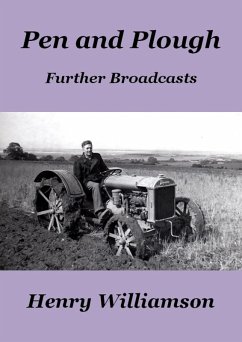Henry Williamson (1895-1977), nature writer and novelist, is perhaps best remembered today as a 'nature' writer, the author of the much-loved classics 'Tarka the Otter' and 'Salar the Salmon', although he wrote over fifty books during a long life, including the 'Flax of Dream' tetralogy and his major work, the 15-volume novel sequence 'A Chronicle of Ancient Sunlight'. What is not so well known is that during the late 1930s he became a broadcaster of some repute on the BBC. 'Pen and Plough' collects twenty-one scripts of the broadcast talks given by Williamson between 1936 and 1967. Ten of these were broadcast only in the BBC's Empire Service (forerunner of its renowned World Service) in 1938/39, and concern the countryside and farming the BBC called them 'nice, pleasant, dreamy talks, to make people homesick for England'. A further four talks are about Williamson's ongoing struggle to bring life back to the derelict farm in North Norfolk that he had bought in 1937, while one of the later broadcasts has the intriguing title 'On Seeing Marilyn Monroe'. There is a separate section of talks on books and writers, including broadcasts on R. D. Blackmore's famous Exmoor novel Lorna Doone, and the novelist Arnold Bennett.
'Pen and Plough', with the companion 'Spring Days in Devon' (both available as e-books), contain all forty-three of the surviving scripts of Henry Williamson's popular talks for the BBC.
Dieser Download kann aus rechtlichen Gründen nur mit Rechnungsadresse in A, B, CY, CZ, D, DK, EW, E, FIN, F, GR, H, IRL, I, LT, L, LR, M, NL, PL, P, R, S, SLO, SK ausgeliefert werden.


